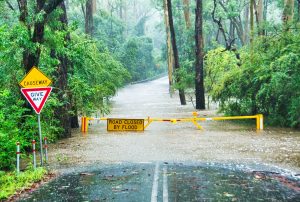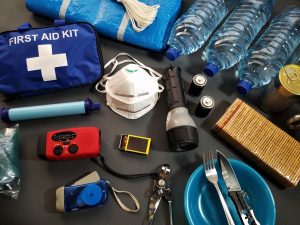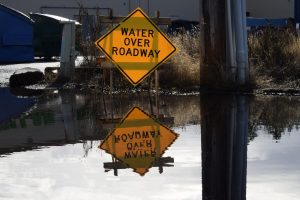When is Flood Season?

Flooding can be dangerous and unexpected. In fact, the results of a major flood can be catastrophic. That’s why it is incredibly important to make sure that you know when floods are more likely to occur throughout the year. Do floods have a certain “flood season” similar to hurricane season? Keep reading to find out!
Flood Season Timing
Flood season is the time of year when there is an increased risk of flooding. Flood season can be a stressful time for those who live in areas prone to flooding. However, unlike other events like hurricane season, there are no specific dates for when flood season occurs. A good rule of thumb is to assume it is flood season at any time. After all, you never know when you are going to get a large amount of sudden rainfall. Despite this, the most common time for flooding is from spring to fall. Winter has less of a chance of flooding, but that does not mean it is not possible.
Be Ready for Flood Season
 According to FEMA, a flood is categorized as “a general and temporary of partial or complete inundation of 2 or more acres of normally dry land area or of 2 or more properties.”
According to FEMA, a flood is categorized as “a general and temporary of partial or complete inundation of 2 or more acres of normally dry land area or of 2 or more properties.”
There are many ways to prepare for flood season, and floods in general. This information is extremely important if you live in an area that experiences floods often.
First, check your flood insurance policy to make sure you are properly covered. If you do not have flood insurance, it is always a great idea to get covered. Flood insurance will cover many instances that regular homeowners insurance will not cover, so you will not find yourself in a financial jam if your home floods.
It’s also a good idea to create an emergency kit with supplies like non-perishable food, water, and first-aid supplies. Finally, make sure you know your property’s flood zone so you can be aware of the risk of flooding. By taking these precautions, you can help minimize the impact of flooding if your area is affected.
There are a few things you can do to prepare for flood season. First, check your flood insurance policy to make sure you are properly covered. It’s also a good idea to create an emergency kit with supplies like non-perishable food, water, and first-aid supplies. Finally, make sure you know your property’s flood zone so you can be aware of the risk of flooding.
Preparing for a Flood
Taking these steps can help you be prepared in the event of flooding. However, it’s also important to know what to do during flood season. If you live in an area that is prone to flooding, be sure to take extra precautions to keep your property safe. This can include things like moving valuables to higher ground and sandbagging your doors and windows.
If you live in an area that is prone to flooding, be sure to take extra precautions to keep your property safe. This can include things like moving valuables to higher ground and sandbagging your doors and windows. You should also have an evacuation plan in place so you know what to do if a flood does occur.
What does Flood Insurance Cover?
Flood insurance is a great coverage to have if you live in an area prone to flooding. Since homeowners insurance often does not cover floods and water damage, this will make sure that you have help if something happens to your property. In fact, if you live in a flood zone, you likely are required to have flood insurance regardless.
 Some of the things that flood insurance covers include:
Some of the things that flood insurance covers include:
- Electrical and plumbing systems
- Furnaces and water heaters
- Kitchen appliances
- Foundation
- Fuel tanks
- Curtains
- Washers and dryers
- Personal belongings (clothing, furniture, electronics, etc.)
- Valuable items such as artwork
- Carpeting
Essentially, the damage needs to be directly caused by flooding in order to be covered by flood insurance.
What to Do in a Flood
If a flood does occur, you will want to stay informed. Keep updated on the news using the radio or television. If necessary, evacuate quickly and safely to avoid being stranded. Even if it has not started flooding in your specific area when you are told to evacuate, you need to keep alert. A flash flood can occur at any moment, and you will want to move towards higher ground as you evacuate. Flash floods occur more frequently in areas near streams, drainage channels, and other similar places.
Do not try to drive through floodwaters – just six inches of moving water can knock you down, and two feet of water can sweep your vehicle away. If you are stranded, call for help and wait for rescue workers to arrive.
You will also want to secure your home. Make sure you disconnect any electrical appliances and utilities, and also bring outdoor furniture inside. If you can, move your most important items to the top floor of the home. Try to stay informed at all times.
After a Flood
 When the floodwaters die down, it can still be dangerous in the next few days. Keep a few things in mind when returning to your home after a flood.
When the floodwaters die down, it can still be dangerous in the next few days. Keep a few things in mind when returning to your home after a flood.
- Avoid any moving water
- Do not try to enter damaged areas unless you are informed that it is safe to do so
- Continue keeping informed on the latest news in case another flood occurs
- Be careful going through areas that have been damaged as the structure of the area may have changed or may be weaker
- Evaluate everything in your home to see if there was any damage done. If there was, make sure you contact your flood insurance provider
Contact Sound Choice Insurance for Flood Insurance
Flood season can be a stressful time, but by taking some simple precautions you can help keep yourself and your property safe. It is always important to have flood insurance to prevent financial hardship if a flood does damage your property. If you are looking for flood insurance near the Morehead City, North Carolina area, contact us here at Sound Choice Insurance. We are able to assist you in obtaining flood insurance for the lowest price – while still maintaining the highest value. If you do need to submit an insurance claim after a flood has occurred in your home, we are able to help you through the process! Contact us today to get started on obtaining flood insurance for your property.
